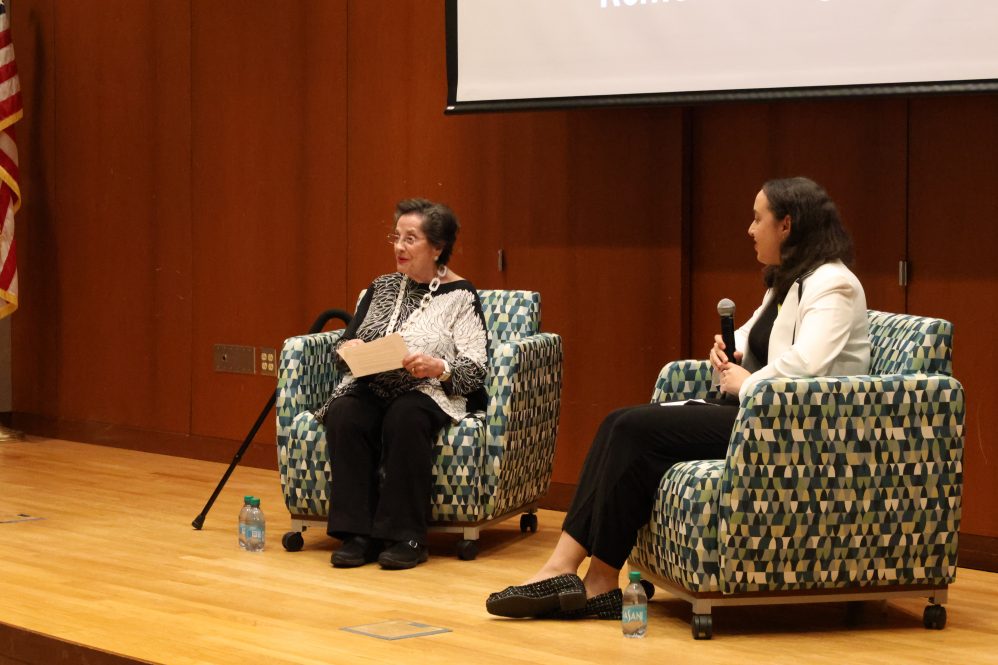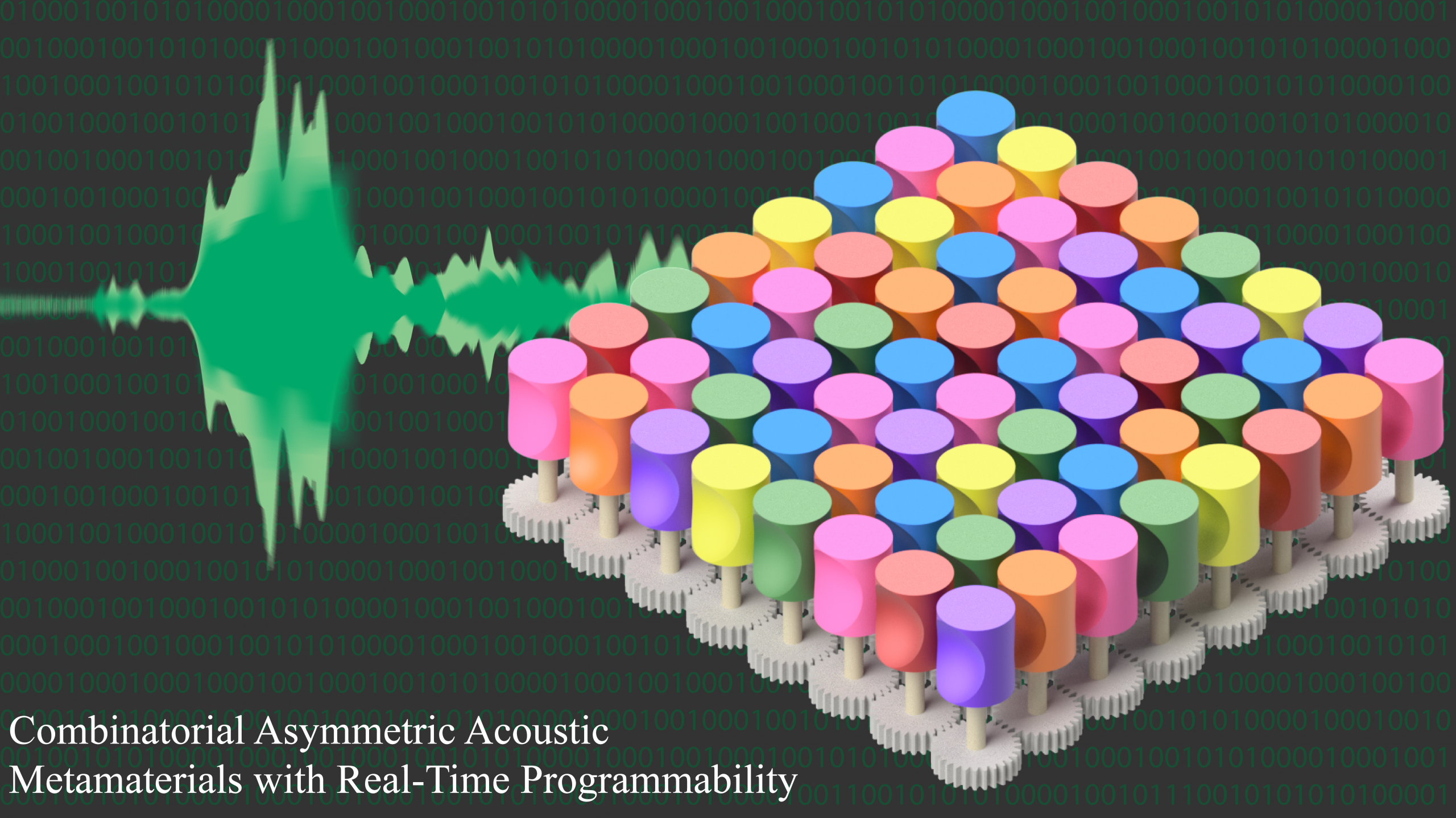Fourteen years ago, Nina Jacobs’s youngest son called to tell her that someone from Israel was looking for her. When she found out the person knew her given birth name, Jacobs knew there was only one person in the world who would know that information: her father’s sole surviving brother.
Jacobs spoke to her uncle on the phone in Yiddish and immediately made plans to visit him in Israel, where she was finally able to connect with her biological father’s side.
“It’s still painful to this day because I would have loved to have seen what my mother and my uncle told me about him and how they described him,” said Jacobs. “And since I don’t resemble my mother, I have to perceive that I look like my father.”
Now in her 80s, Jacobs lived through the Holocaust as a child and spoke about her experiences to UConn students and faculty at the Konover Auditorium in The Dodd Center for Human Rights on April 23.
“There’s limited opportunity to come and talk to a Holocaust survivor in person and be able to hear about what they had gone through as a firsthand experience,” said Yana Tartakovskiy ’25 (BUS), one of the event organizers and founder of the group Jewish on Campus UConn. “This really emphasizes the significance of why learning about the Holocaust is so important in Jewish history but also why it shouldn’t happen again.”
Jacobs was born in 1942 in the Vilna Ghetto in Poland, just three years after Hitler invaded the country.
Before she was born, her newlywed parents, uncle, grandmother, and aunt all lived in the ghetto. One night when her mother and father left the ghetto to get fresh air, they were arrested and placed in separate prisons. The next morning, the women were led out of the prison while the men were taken to be killed.
About a month after Jacobs’s father failed to return to her mother, she found out she was pregnant with her first child.
Her mother feared for her safety as the Nazis had decreed any pregnant woman found in the ghetto would immediately be killed.

“Whatever will become of us will become of the child, but in the event that that child may survive, they will be an indication in the world that that child once had a young father that didn’t have an opportunity to live,” Jacobs said, quoting her grandmother.
Jacobs spent the first 17 months of her life living in an attic with her mother.
“I never stepped outdoors. I never felt the sun. I never felt the wind. I knew nothing. This was my world, this little room with my mother,” said Jacobs.
After hearing rumors speculating that Nazis were coming to take the remaining children out of the ghetto, Jacobs’s uncle arranged a hand-off with a Polish woman who said she would take the baby. The woman brought Jacobs to the farm where she, her husband, her son, Yanek, and grandson lived.
When Jacobs awoke, she continuously cried for her mother in Yiddish, putting the whole family in danger. If Nazis heard Yiddish, everyone would have been killed. So, they decided to dig a grave and lower the screaming baby into it.
After 10 days, she stopped screaming.
They took her out from under the ground, cleaned her and brought her into this new family. Jacobs attributes this moment to the start of her new life, being raised by Yanek, who became her surrogate father, through and after the war.
Of her family, her mother, grandmother, uncle, and aunt survived the war and were in displaced persons camps.
Every day, her mother and grandmother would come to see her at Yanek’s house. Then one day, they took her to go pick flowers and when she asked to go home to her family, the women told her no.
“We are your family. You have to stay with us now,” Jacobs said her biological family told her.
“I only wanted my father, but it was to be,” said Jacobs. “I was unhappy, and I cried, and I wailed but it didn’t help. I had no choice. My mother wanted me to distance myself from Yanek, so she didn’t allow him to come see me.”
Jacobs’s mother remarried and her new stepfather had an uncle who sponsored them to move to America. They left Poland and lived in Germany for two years before finally making it to the United States in 1949.
Before they departed Poland, Jacobs’s mother agreed that Yanek could come say goodbye to her.
“I wasn’t prepared to see him, but when he walked in, I jumped into his arms, and he put his arms around me, and he was crying, and I was crying. Our tears were commingling,” said Jacobs.
Yanek begged to keep Jacobs in Poland with him until she was 18, but her mother insisted that if she stayed until she was 18, Jacobs would be his daughter and not hers.
Jacobs and her family were processed through Ellis Island and started to navigate their new life in America without speaking English.
Today, Jacobs lives in Hartford and speaks out, sharing her story.
“This year marks 80 years since the Holocaust ended and is a very important year in Holocaust remembrance. So, just in having this, we just want her to be able to use the most amount of time she can,” said Eva Dannison, co-president of Jewish on Campus UConn. “There’s not many Holocaust survivors left, so this was a very once-in-a-lifetime opportunity for people to get to listen to.”
This event was made possible by a collaboration between The Gladstein Family Human Rights Institute, Jewish on Campus UConn, and UConn Hillel.



